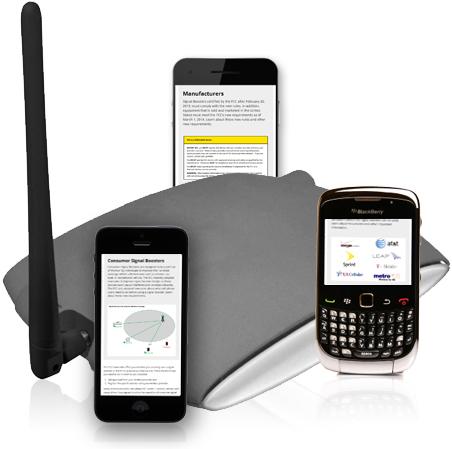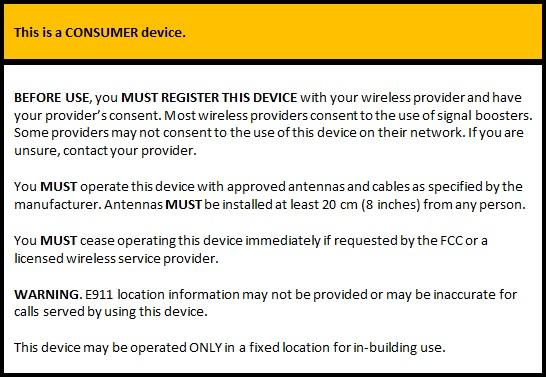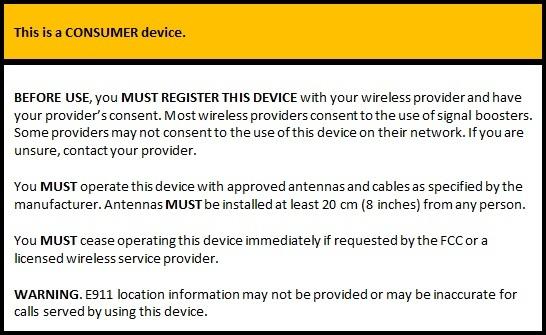
What are signal boosters?
Signal boosters are devices that can help cell phone users improve their coverage in areas where they do not get a good signal. For example, signal boosters can be placed in homes or cars to provide increased signal strength for cell phones, which may let the user complete a call in areas where they previously couldn’t. When these devices are properly installed, they can help consumers, wireless service providers, and public safety first responders by extending cell phone coverage to areas that would otherwise have weak signals such as tunnels, subways, inside buildings, and in rural areas.
Although signal boosters can improve cell phone coverage, malfunctioning, poorly designed, or improperly installed signal boosters can interfere with wireless networks and cause interference to a range of calls, including emergency and 911 calls.
Did the FCC recently adopt new rules for signal boosters?
Yes. In March of 2014, the FCC adopted new rules to improve signal booster design so these devices won’t cause interference to wireless networks. The FCC also adopted new rules about what cell phone users need to do before using a signal booster.
I already have a signal booster; do I need to do anything?
If a wireless provider or the FCC asks you to turn off your signal booster because it is causing interference to a wireless network, you must turn off your booster and leave it off until the interference problem can be resolved. When the new rules go into effect, you will be able to purchase a booster with additional safeguards that protect wireless networks from interference.
I’d like to buy a signal booster today, what should I do?
Signal boosters with additional safeguards that meet the new rules are available for sale. Most wireless providers, including AT&T, Sprint, T–Mobile, and Verizon, have authorized the use of these new signal boosters. New signal boosters will have this label:
It is possible that the warning label looks different than the sample label below. However, the warning label must include the same information.
For Fixed Consumer Signal Boosters

It is possible that the warning label looks different than the sample label below. However, the warning label must include the same information.
For Mobile Consumer Signal Boosters

Before you purchase a signal booster that does not have this label (or if you are unsure whether a particular model of signal booster will comply with the new rules), contact your wireless provider or the booster manufacturer. In addition, when your wireless provider develops a registration process, you must register your booster with your provider. There is no fee to register your booster.
Someone contacted me and said I have to shut down my booster because it’s causing interference. What should I do?
The FCC’s rules prohibit signal booster users from causing interference to wireless networks, even if the user has complied with all the other rules. If you are contacted by the FCC or any wireless provider – yours or any other – and told your signal booster is causing interference, you must shut it down until you can fix the interference problem.
The label on the booster says "E911 location information may not be provided or may be inaccurate for calls served by using this device." What does that mean?
E911 systems automatically provide a 911 caller’s call back number to emergency service personnel and, in most cases, location information. When you use a signal booster to complete a call to 911, this location information may not be provided or may be inaccurate. This may affect the ability of emergency personnel to locate you if necessary. It is important to remember that signal boosters may help you complete calls, including calls to 911, in areas where you previously couldn’t. Each person should decide whether to use a signal booster given their individual circumstances.
Can I purchase and use a signal booster with an "Industrial Use" label?
No. The FCC has established special rules for Consumer Signal Boosters to make sure they are simple to install and use, and won't harm wireless networks. Consumers should make sure they only purchase and use boosters with a Consumer Use label. Other boosters labeled for “Industrial Use” require special installation expertise and may only be used by FCC licensees or those given special permission.
It is possible that the warning label looks different than the sample label below. However, the warning label must include the same information. 
My new car, boat, recreational vehicle (RV), etc. comes equipped from the manufacturer with a built-in signal booster; what should I do before I can use it?
Many types of new vehicles will come equipped from the factory with onboard signal boosters. You must register your vehicle’s booster with your wireless provider before you may use it. Passengers that make use of your vehicle’s booster on a regular, sustained basis also must register the booster with their wireless provider.
Registration and labeling information for your vehicle’s signal booster may be found either in the owner’s manual, on the manufacturer’s website, or in materials furnished by the dealer.
I manufacture vehicles and would like to begin installing signal boosters in my products. How do I comply with the new FCC rules?
In order to comply with the FCC signal booster rules, you must satisfy the four requirements listed in section 20.21(f) of the Commission’s Rules, 47 C.F.R. § 20.21(f). According to the rule, all signal booster label advisories must be made available: (1) in on-line, point-of-sale marketing materials, (2) in any print or on-line owner's manual and installation instructions, (3) on the outside packaging of the device, and (4) on a label affixed to the device.
If you are unable to comply with all four of the requirements (e.g. you must install the booster behind the dash of a car, out of sight or inaccessible to the vehicle's occupants), then you may request a partial waiver of section 20.21(f). The Commission grants such waivers on a case-by-case basis.
The Commission recommends that manufacturers describe how they will provide consumers with the FCC-required label information through alternative means. We have included here partial waivers that we granted to serve as illustrative examples. Manufacturers should direct all signal booster compliance inquiries to Amanda Huetinck of the Wireless Telecommunications Bureau, (202) 418-7090.